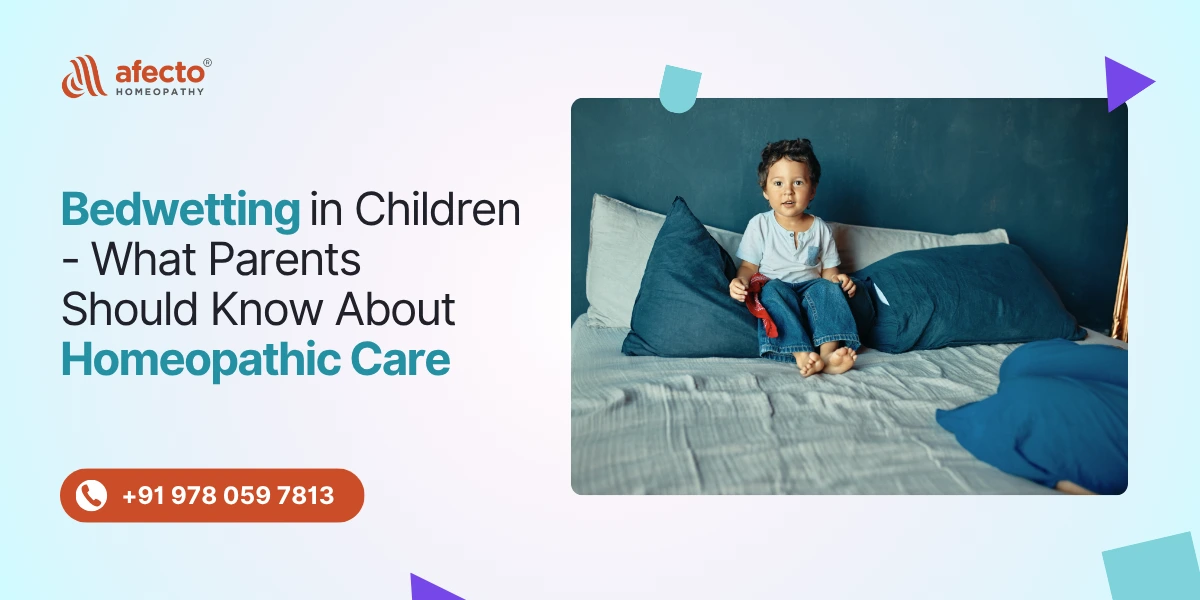It’s a question many parents quietly worry about but rarely discuss. Bedwetting—also known as nocturnal enuresis—is more common than most people think. While it can feel stressful for both the child and parents, understanding why it happens and how homeopathy approaches it can make the journey easier and more compassionate.
Understanding Bedwetting in Children
Bedwetting refers to involuntary urination during sleep, usually after the age when a child is expected to stay dry at night.
Doctors usually consider bedwetting normal up to about age 5, but if it continues beyond age 6–7, it may be time to look deeper.
Some common search questions parents ask are:
- “Why is my 9-year-old still wetting the bed?”
- “Is bedwetting at age 10 normal?”
- “Can ADHD cause bedwetting?
Let’s break down the main reasons.
Common Reasons for Bedwetting
Most cases of bedwetting are not caused by laziness or emotional immaturity—a misconception that can make children feel guilty or anxious.
- Delayed Bladder Development: The child’s bladder may not yet be mature enough to hold urine overnight.
- Deep Sleep Cycles: Some children sleep so deeply that they don’t wake up when their bladder is full.
- Hormonal Factors: Low levels of the antidiuretic hormone (ADH) at night can cause more urine production.
- Genetic Predisposition: Bedwetting often runs in families—if one or both parents had it, their child has a higher chance too.
- Stress or Emotional Triggers: School pressure, new surroundings, or family changes can sometimes contribute.
- ADHD or Sleep Disorders: Children with ADHD or certain sleep conditions may have more frequent episodes.
How Homeopathy Understands Bedwetting

From a homeopathic perspective, bedwetting is not simply a physical issue but a mind-body imbalance that reflects both emotional sensitivity and physiological immaturity. Homeopathy believes that the body has an innate self-regulating force, and when that balance is disturbed—by stress, fear, or internal weakness—it can manifest as symptoms like involuntary urination.
Here’s how homeopathy interprets the deeper layers behind this condition:
- Emotional Sensitivity: Many bedwetting children are emotionally delicate—easily hurt, shy, or anxious when separated from parents. Homeopathy views such emotional triggers as key contributors.
- Fear or Insecurity: Fear of the dark, nightmares, or fear of being alone are often associated with remedies like Pulsatilla or Causticum.
- Suppressed Emotions: When a child suppresses feelings—perhaps due to strict parenting, competition, or sibling rivalry—it can express as a physical outlet, including bedwetting.
- Neuromuscular Immaturity: Homeopathy acknowledges that the nerve control between the brain and bladder can be slow to develop in some children, requiring gentle stimulation through individualized remedies.
- Inherited Tendencies: Homeopaths also consider family history and constitutional patterns—such as those seen in parents who had late bladder control or emotional sensitivity during childhood.
In this view, the goal of homeopathic treatment is to address both the child’s emotional temperament and the body’s regulation mechanisms—helping restore a natural balance without suppressing symptoms.
Homeopathic Treatment for Night Time Bed Wetting in Children
Parents often turn to homeopathy because it’s gentle, individualised, and non-habit-forming. Homeopathy doesn’t just target the bladder—it looks at the child as a whole: their sleep pattern, fears, confidence, and emotional makeup. Homeopathy is thought to work by stimulating the body’s natural healing ability, helping regulate bladder control and emotional balance.
Some of the most commonly considered homeopathic remedies for bedwetting in children include:
- Causticum – Often prescribed for children who tend to wet the bed during the first part of sleep. These children are usually very sensitive, empathetic, and deeply affected by emotions or others’ distress.
- Sepia – Considered when the child appears moody, indifferent, or emotionally withdrawn. It’s often used when bedwetting is linked to suppressed emotions or emotional fatigue.
- Kreosotum – Helpful when bedwetting happens during deep sleep or when the child feels a strong urgency to urinate upon waking.
- Sulphur – Suited to restless sleepers who toss and turn, often feeling hot at night. These children may have an active mind even in sleep.
- Pulsatilla – Ideal for affectionate, gentle, and shy children who crave reassurance. Bedwetting may occur after emotional upsets, excitement, or changes in routine.
*These references are based on traditional Materia Medica and homeopathic clinical practice, such as the Boericke Materia Medica and Allen’s Keynotes, not on large-scale clinical trials. Each child is different, so a qualified homeopathic doctor will select the remedy after studying the child’s physical, mental, and emotional traits—not just the symptom of “wetting the bed.”*
When Should Parents Seek Help?
Occasional bedwetting before age 6 is normal. But it’s advisable to consult a professional if:
- Your child is age 5–7 or older and still wets the bed frequently.
- Bedwetting is sudden, after being dry for months.
- There’s daytime wetting, pain, or burning during urination.
- The child feels ashamed, anxious, or avoids sleepovers.
- You notice snoring or restless sleep, which could suggest sleep apnea.
A detailed evaluation helps rule out infections or anatomical causes and allows the doctor to guide you toward the most suitable treatment plan.
What Parents Can Do at Home

Bedwetting is not your child’s fault—and definitely not a sign of failure as a parent. Support and consistency are key.
Here are some small but powerful steps you can take:
- Avoid punishment. Encourage and reassure your child instead.
- Establish a bedtime routine. Encourage bathroom use right before sleep.
- Limit fluids close to bedtime, especially caffeinated or sugary drinks.
- Use protective bedding, but don’t make it feel like a big deal.
- Involve your child. Let them help change sheets calmly—it builds responsibility without shame.
- Encourage daytime bladder habits. Make sure they urinate regularly and don’t “hold it in.”
- Try relaxation techniques. Deep breathing or bedtime stories can reduce anxiety.
- Use a bed-wetter alarm—but only under expert guidance, as some children may find it stressful.
Remember: empathy and patience can go a long way in helping your child feel confident again.
Why Parents Choose Homeopathy at Afecto Clinics
At Afecto Homeopathic Clinics, parents appreciate our personalized, child-friendly approach. Our doctors take the time to understand not just the symptom, but the child’s habits, temperament, and emotional triggers.
Homeopathic treatment at Afecto aims to:
- Support the body’s natural rhythm of bladder control
- Address stress or emotional sensitivity
- Promote deep, restful sleep
- Use gentle, non-habit-forming remedies
Every child receives customized care—there’s no “one-size-fits-all” approach.
Where to Find Us
Parents across India trust Afecto Homeopathic Clinics for gentle, effective solutions to children’s health concerns. If you’re searching for the best homeopathic doctor near me or expert care for bedwetting in children, visit your nearest Afecto Clinic in Delhi (Green Park, South Delhi), Jalandhar, Amritsar, Patiala, Phagwara, Hoshiarpur, Sirhind, or Dharamshala. Our experienced doctors are here to guide your child’s recovery with empathy and care — both in-clinic and through online homeopathy consultations from the comfort of your home.
“Learn how homeopathy offers a gentle, effective approach to manage bedwetting in children. Discover expert-recommended remedies and care tips from Afecto Clinics.”
Prefer consulting from home?
Book an online homeopathy consultation with Afecto’s certified specialists and get personalised guidance for your child’s bedwetting — wherever you are.
Bedwetting can test a parent’s patience—but it’s rarely a reason to worry.
In most cases, children eventually outgrow it. What matters most is creating a supportive environment and choosing care that respects their individuality.
Homeopathy offers a gentle, holistic way to guide that process—especially when done under the supervision of an experienced professional.
If your child is struggling with bedwetting, Afecto’s doctors are here to listen, understand, and help you find a personalized homeopathic solution that fits your child’s needs.
FAQs
1. Is bedwetting normal for a 9-year-old?
Occasional bedwetting at this age can still occur, but if it’s frequent, a consultation is recommended to rule out underlying causes and explore treatments like homeopathy.
2. Can stress or anxiety cause my child to wet the bed?
Yes. Emotional stress—such as school pressure or family changes—can sometimes trigger bedwetting in sensitive children.
3. How long does homeopathic treatment for bedwetting take?
This varies depending on the child’s overall health and triggers. Some see improvement in a few weeks, while others may need longer-term support.
4. Does homeopathy have any side effects?
Homeopathic medicines are generally considered safe and gentle when prescribed by a qualified doctor.
5. Can I consult an Afecto homeopathic doctor online?
Yes. Afecto offers online homeopathy consultation options so you can get expert advice from home.


